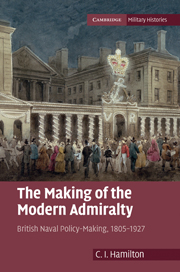Book contents
- Frontmatter
- Contents
- List of tables
- Preface
- Introduction
- 1 Lord Barham's Admiralty: 1805
- 2 Admiralty reform, 1806–1835
- 3 Decision-making at the Admiralty, c. 1806–1830
- 4 Admiralty administration and decision-making, c. 1830–1868. The Graham Admiralty
- 5 The Admiralty reformed again: context and problems, 1868–1885
- 6 Administrative and policy-making responses, c. 1882 onwards
- 7 Fisher and Churchill, and their successors, 1902–1917
- 8 The Naval Staff, planning and policy
- 9 Lord Beatty's Admiralty
- Conclusion
- Appendix 1 First Lords, First Sea Lords and Permanent Secretaries, 1805–1927
- Appendix 2 Acronyms and definitions
- Manuscript sources and select bibliography
- Index
1 - Lord Barham's Admiralty: 1805
Published online by Cambridge University Press: 03 May 2011
- Frontmatter
- Contents
- List of tables
- Preface
- Introduction
- 1 Lord Barham's Admiralty: 1805
- 2 Admiralty reform, 1806–1835
- 3 Decision-making at the Admiralty, c. 1806–1830
- 4 Admiralty administration and decision-making, c. 1830–1868. The Graham Admiralty
- 5 The Admiralty reformed again: context and problems, 1868–1885
- 6 Administrative and policy-making responses, c. 1882 onwards
- 7 Fisher and Churchill, and their successors, 1902–1917
- 8 The Naval Staff, planning and policy
- 9 Lord Beatty's Admiralty
- Conclusion
- Appendix 1 First Lords, First Sea Lords and Permanent Secretaries, 1805–1927
- Appendix 2 Acronyms and definitions
- Manuscript sources and select bibliography
- Index
Summary
Lord Barham, the Board and the Admiralty Office
Lord Barham's position at the very centre of the 1805 Admiralty is nowhere better suggested than in the tale of what happened when the news of Trafalgar arrived at the Admiralty building in Whitehall on the early morning of 1 November. He was in bed, but William Marsden, the First Secretary, knew he had to be roused. Not only was there much to be done, but Barham had shown great annoyance a few months previously on waking to discover he had been left asleep when some urgent news had arrived. So, as Marsden tells us:
Drawing aside his curtain, with a candle in my hand, I awoke the old peer … from a sound slumber; and to the credit of his nerves be it mentioned, that he showed no symptom of alarm or surprise, but calmly asked: ‘What news, Mr. M?’ We then discussed, in a few words, what was immediately to be done, and I sat up the remainder of the night, with such of the clerks as I could collect, in order to make the necessary communications at an early hour to the King, the Prince of Wales, the Duke of York, the Minister, and other members of the Cabinet, and to the Lord Mayor, who communicates the intelligence to the shipping interest at Lloyd's Coffee-house.
- Type
- Chapter
- Information
- The Making of the Modern AdmiraltyBritish Naval Policy-Making, 1805–1927, pp. 6 - 41Publisher: Cambridge University PressPrint publication year: 2011

